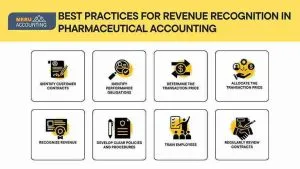What Are the Best Practices for Revenue Recognition in Pharmaceutical Accounting?
Revenue recognition in the pharmaceutical industry can be complex due to the variety of contracts, agreements, and performance obligations involved. Proper revenue recognition is crucial as it directly impacts a company’s financial statements and decision-making processes.
The guidelines under ASC 606, the standard for revenue from contracts with customers, provide a framework for recognizing revenue consistently and accurately. Here are some best practices for pharmaceutical industry accounting to ensure compliance with ASC 606.
Best Practices for Revenue Recognition in Pharmaceutical Accounting

Identify Customer Contracts
The first step in revenue recognition is identifying and defining contracts with customers. This includes documenting all agreements, understanding the terms and conditions, and accounting for any modifications. In the pharmaceutical industry, contracts can involve licensing, supply agreements, and other complex arrangements. Properly identifying these contracts sets the foundation for accurate revenue recognition.
Identify Performance Obligations
Performance obligations are distinct goods or services promised within a contract. In the pharmaceutical industry, these could include licensing agreements, drug manufacturing, research and development services, and milestone payments. Clearly defining each performance obligation helps in determining how and when revenue should be recognized.
Determine the Transaction Price
Calculating the transaction price involves estimating the total consideration expected from the contract. This can be straightforward or involve complexities like variable considerations, including royalties, milestone payments, or rebates. Accounting in the pharmaceutical industry requires careful estimation and updating of these figures to ensure revenue is recognized correctly.
Allocate the Transaction Price
Once you know the total amount of money you’ll receive, you need to divide it among the different parts of the contract according to how much each part would cost if sold separately. This allocation ensures that revenue is recognized in a manner that reflects the transfer of goods or services to the customer as outlined in the contract. In the pharmaceutical industry, this can mean allocating revenue between different stages of drug development, licensing, and ongoing support services.
Recognize Revenue
Revenue is recognized when a performance obligation is satisfied, either at a point in time (e.g., delivery of a drug) or over time (e.g., ongoing research services). For the pharmaceutical industry, this means accurately reflecting when control of a good or service passes to the customer. Proper accounting practices ensure that revenue is recorded in the correct periods, providing a true reflection of business performance.
Develop Clear Policies and Procedures
Establishing clear revenue recognition policies and procedures that align with ASC 606 is crucial. These policies should be thoroughly documented and consistently applied to all contracts. For pharmaceutical industry accounting, this helps maintain uniformity and compliance across different transactions and agreements.
Train Employees
Providing detailed training to employees involved in the revenue recognition process ensures they understand the principles of ASC 606 and the company’s specific policies. In the pharmaceutical industry, where contracts can be intricate, well-trained staff are essential for maintaining accurate financial records.
Regularly Review Contracts
Contracts and agreements should be regularly reviewed to ensure revenue recognition practices remain compliant with ASC 606 and reflect any changes in the business environment. This is particularly important in the pharmaceutical industry, where regulatory changes, contract amendments, and new business models can impact how revenue is recognized.
Conclusion
Proper accounting in the pharmaceutical industry, especially regarding revenue recognition, is crucial for maintaining compliance and ensuring accurate financial reporting. By adhering to best practices, such as clearly identifying contracts, defining performance obligations, and regularly reviewing agreements, pharmaceutical companies can effectively navigate the complexities of ASC 606.
Partnering with Meru Accounting enhances compliance and accuracy in pharmaceutical industry accounting, allowing businesses to concentrate on their core mission while ensuring robust and reliable financial practices. Accurate accounting in the pharmaceutical industry is not merely about following rules; it’s about establishing a foundation for sustainable success.


